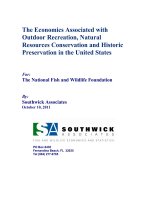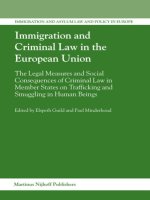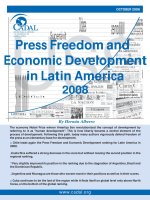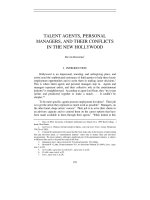SOCIAL RIGHTS AND MARKET FREEDOM IN THE EUROPEAN CONSTITUTION docx
Bạn đang xem bản rút gọn của tài liệu. Xem và tải ngay bản đầy đủ của tài liệu tại đây (2 MB, 320 trang )
This page intentionally left blank
SOCIAL RIGHTS AND MARKET FREEDOM
IN THE EUROPEAN CONSTITUTION: A
LABOUR LAW PERSPECTIVE
This is a timely and innovative account of the development of Euro-
pean labour and social security law as it interrelates with the evolution
of market integration in the European Union. Giubboni presents, from a
labour law perspective, a case study of the changes the European Commu-
nity/European Union has undergone from its origins to the present day
and of the ways these changes have affected the regulation of European
Welfare States at national level. Drawing on the idea of ‘embedded liber-
alism’, Giubboni analyses the infiltration of EC competition and market
law into national systems of labour and social security law, and provides a
normativeframework for conceptualising the transformation of regulatory
techniques implemented at the EU level. This important, interdisciplinary
contribution to research inEU social law illustrates how the vision of social
protection and solidarity is changing.
stefano giubboni is Professor of Labour Law in the Law Faculty,
University of Florence.
CAMBRIDGE STUDIES IN EUROPEAN LAW
AND POLICY
This series aims to produce original works which contain a critical analysis
of the state of the law in particular areas of European Law and set out
different perspectives and suggestions for its future development. It also
aims to encourage a range of work on law, legal institutions and legal
phenomena in Europe, including ‘law in context’ approaches. The titles
in the series will be of interest to academics; policymakers; policy formers
who are interested in European legal, commercial and political affairs;
practising lawyers including the judiciary; and advanced law students and
researchers.
Joint Editors
Professor Dr Laurence Gormley
Rijksuniversiteit Groningen, The Netherlands
Professor Jo Shaw
University of Edinburgh
Editorial advisory board
Professor Richard Bellamy, University of Reading; Ms Catherine Barnard,
University ofCambridge; ProfessorMarise Cremona, Queen Mary College,
University of London; Professor Alan Dashwood, University of Cambridge;
Professor DrJacqueline Dutheil dela Roch
`
ere, Universit
´
e de Paris II, Direc-
tor of the Centre de Droit Europ
´
een, France; Dr Andrew Drzemczewski,
Council of Europe, Strasbourg, France; Sir David Edward KCMG, QC, for-
mer Judge, Court of Justice of the European Communities, Luxembourg;
Professor Dr Walter Baron van Gerven, Emeritus Professor, Leuven and
Maastricht and former Advocate General, Court of Justice of the Euro-
pean Communities; Professor Daniel Halberstam, University of Michigan,
USA; Professor Dr Ingolf Pernice, Director of the Walter Hallstein Institut,
Humboldt Universit
¨
at, Berlin; Michel Petite, Director General of the Legal
Service, Commission of the European Communities, Brussels; Professor
Dr Sinisa Rodin, University of Zagreb; Professor Neil Walker, University
of Aberdeen and EUI, Fiesole.
Booksintheseries
EU Enlargement and the Constitutions of Central and Eastern Europe
by Anneli Albi
Social Rights and Market Freedom in the European Constitution: A Labour
Law Perspective
by Stefano Giubboni
The Constitution for Europe: A Legal Analysis
by Jean-Claude Piris
SOCIAL RIGHTS AND
MARKET FREEDOM IN THE
EUROPEAN CONSTITUTION
A Labour Law Perspective
STEFANO GIUBBONI
Translated by
RITA INSTON
cambridge university press
Cambridge, New York, Melbourne, Madrid, Cape Town, Singapore, São Paulo
Cambridge University Press
The Edinburgh Building, Cambridge cb2 2ru,UK
First published in print format
isbn-13 978-0-521-84126-9
isbn-13 978-0-511-13981-9
© Stefano Giubboni 2005
2006
Informationonthistitle:www.cambrid
g
e.or
g
/9780521841269
This publication is in copyright. Subject to statutory exception and to the provision of
relevant collective licensing agreements, no reproduction of any part may take place
without the written permission of Cambridge University Press.
isbn-10 0-511-13981-0
isbn-10 0-521-84126-7
Cambridge University Press has no responsibility for the persistence or accuracy of urls
for external or third-party internet websites referred to in this publication, and does not
guarantee that any content on such websites is, or will remain, accurate or appropriate.
Published in the United States of America by Cambridge University Press, New York
www.cambridge.org
hardback
eBook (EBL)
eBook (EBL)
hardback
To Leonardo
‘Raising his son [Hector] kissed him,
tossed him in his arms and
lifted a prayer to Zeus ’
Iliad Book VI, 474–5
CONTENTS
SeriesEditors’Prefacepagexi
ForewordbyProfessorSilvanaSciarraxiii
Acknowledgementsxv
TableofCasesxvii
TableofLegislationxxi
Introduction1
part i Social policies and market principles. European social
integration revisited 5
1 Embedded liberalism: the original constitutional compromise
and its crisis 7
1 A preliminary review of the historical background 7
2 Metamorphoses of the European economic constitution and their
impact on national social policies and rights 15
3 ‘Embedded liberalism’: the original compromise in the ECSC
Treaty 29
4 intheOhlinReport 40
5 intheSpaakReport 45
6 andintheTreatyofRome 49
7 Crisis and ‘overthrow’ of the original model 56
8 Infiltration of Community competition and market law into national
systems of labour and social-security law 61
9 End of monetary sovereignty and curbing of macroeconomic
sovereignty in the EMU constitution 65
10 Regulatory competition between national systems within
the internal market 73
11 Weakening of the principle of territoriality of national systems
of social protection 81
vii
viii contents
2 Re-embedding liberalism: towards a new balance between
negative and positive integration of European welfare
states 94
1 The difficult quest for a new balance between negative integration and
positive integration of national welfare states 94
2 Social rights and the market in the European constitutional space in
fieri:developmentsuptotheTreatyofAmsterdam 98
3 andtheprospectsopenedupbytheNiceCharter 106
4 European social policy after Amsterdam 114
5 The new strategy of supranational ‘open’ co-ordination of Member
States’ employment and social policies 121
6TheTreatyestablishingaConstitutionforEurope 128
7 TheconstitutionalTreatyandsocial policy . . . 130
8 TheconstitutionalTreatyandtheopenmethod of
co-ordination 135
9 TheconstitutionalTreatyandtheadvanceoffundamental
socialrights 140
10 . . . A summary assessment of the social content of the
constitutional Treaty 147
part ii The market, competition and social rig hts in the
European constitutional space 151
3 Infiltration of Community competition law into national
systems of labour law, and its antidotes 153
1 Introduction 153
2 Community competition and market law and national systems of
labour law in the original model 155
3 Crisis of the original model . . . 165
4 particularly in the changing interpretation of Article 30 of the
TreatyofRome(nowArticle28TEC) 167
5 andofArticles85,86and90oftheTreatyofRome(now
Articles 81, 82 and 86 TEC) 183
6 Two illustrative examples: public job-placement monopolies and
national social-security monopolies 197
7 Antidotes to the infiltration of competition law: (a) Economic
freedoms and social rights in the aftermath of the Nice Charter and the
constitutionalTreaty 205
8 (b)Constitutional dialogues . . . 215
9 (c)Negativeintegrationandsocialjurisdiction of the
Member States 224
contents ix
4 Forms of regulation of social Europe and models of the
European economic constitution 232
1 Introduction 232
2 Rise and decline of the ‘upward’ harmonization model 233
3 The regulatory impasse of the 1980s and its remedies 235
4 Alternatives to the traditional harmonization model 239
5 Collective bargaining as a ‘regulatory resource’ of the Community
legal order 242
6 Convergence of national systems of social protection via
soft law 244
7 The European Employment Strategy: from the ‘Luxembourg process’
to institutionalization of the open method of co-ordination 245
8 Open co-ordination as a new form of Community economic and social
governance 249
9 An analytical comparison of three ideal-type models of a European
economic constitution 251
10 The neoliberal ‘competitive federalism’ model 254
11 The neo-social-democratic ‘solidaristic federalism’ model 259
12 The mixed ‘co-operative federalism’ model 263
13 A preliminary summing up 269
Conclusions 274
Index 281
SERIES EDITORS’ PREFACE
This timely book addresses a number of enduring debates regarding the
political and legal trajectory of the European Union’s evolving constitu-
tional framework, namely the role and nature of social policy. On the
one hand, the purse strings of the national welfare states are still firmly
guarded by the Member States, which retain the power to tax and grant
benefits. On the other, the logic of the liberalisation of markets has placed
a number of competitive pressures upon welfare states, upon national
systems of labour law, and upon labour markets, which remain largely
national in character. Such national systems are, by their very nature,
diverse, notwithstanding the competitive pressures coming from intra-
EU market liberalisation and, more recently, globalisation and the effects
of the WTO. Many have therefore asked the question about the possible
nature andcharacter ofanyputative ‘Europeansocial model’, andthe posi-
tion of such a model under the EU’s evolving constitutional settlement,
in which market integration has played such a central role.
The book takes the story from the beginnings of the European integra-
tion process, with the ECSC Treaty, the work of the ILO, and other precur-
sors to the initially minimalist social provisions of the EEC Treaty, right
through to the present day. It charts the ongoing pressures for change, and
the reactions of various key actors, including the political institutions of
the European Union, the European Court of Justice, and the national gov-
ernments. Different styles of regulation have evolved, with a decisive shift
towards soft regulation. Yet, at the same time, there has been proposed an
important strengthening of the social rights-basis of the EU, in the form
of the proposed embedding of the 2000 Charter of Fundamental Rights as
Part II of the Constitutional Treaty, agreed by the Member States in June
2004, and undergoing a painful process of ratification at the present time.
This paradox constitutes a key theme of the book. Interestingly, many of
the underlying themes of the book were canvassed, albeit in more emotive
terms, during the French referendum debate in May 2005. However, the
troubles of the EU’s Constitutional Treaty do not in any way detract from
xi
xii series editors’ preface
the importance of a work which is located in a much longer timeline of
history.
This is the second book in the new CUP series Cambridge Studies in
European Law and Policy, edited by Laurence Gormley and Jo Shaw, and
represents animportant contribution to thediscussion of thefuture direc-
tion of European social policy.
laurence gormley and jo shaw
Series Editors
FOREWORD
silvana sciarra
A foreword written by an older academic who followed and supervised
a younger colleague’s work conceals a very subtle dilemma. Praising too
much or too little may reveal differing degrees of involvement in someone
else’s work and even a concern not to interfere with a distinct and separate
intellectual enhancement. And yet, sharing the doubts, the aspirations
and the fears of the lengthy enterprise leading to the publication of a
book means, in a sense, becoming part of that journey, while at the same
time maintaining a sufficiently detached critical eye.
When the final result – as in the present case – follows a rigorous, well-
balanced and deeply investigated line of research, self-restraint must give
way to enthusiasm and joy. A wide community of readers now becomes
the addressee of what the author delivers. The circulation of ideas thus
starts to follow an unpredictable route, since this book challenges the
curiosities of scholars in both labour law and European law.
Stefano Giubboni is a member of a very special generation of European
labour lawyers, whose interests spread well beyond the boundaries of
domestic law. The stimulating environment of the European University
Institute contributed, in expanding the research questions and adding
new dimensions to both national and European legal research.
However, Stefano Giubboni’s writing is characterized by an inborn per-
sonal instinct to seek out the historical and social reasons behind the law.
This enables him to shake up some convention-ridden versions of histor-
ical events and to throw new light on significant documents which paved
the way to the birth of European social policies. One move in this direc-
tion is represented by the original analysis of the interrelation between
the Ohlin and the Spaak Reports, both of them relevant to an understand-
ing of the Common Market’s social and economic foundations. Similarly
inspiring is the analysis of the European Court of Justice’s case-law dealing
with the delicate balance between social values and competition rules.
In the updated, albeit as yet tentative, interpretation of the social rights
enshrined inthe Treaty establishinga Constitutionfor Europe onecanvery
xiii
xiv professor silvana sciarra
clearly feel how Stefano Giubboni’s scrupulous historical reconstruction
is still the best companion for an understanding of current events.
A highly personal touch added by the author of the present book has to
do with the attention he pays to the language of labour law. Although this
singularity owes much to the exceptional skills of the translator, it must
be underlined how such a language returns on the scene as a protagonist,
showing its remarkable power. Linguistic metaphors assist the author
throughout his work, as if he were seeking to express a new centrality of
this legal discipline which also coincides with the construction of its new
identity. Indeed, in the light of the new centrality of labour law it is greatly
to be hoped that the present Cambridge University Press series will, given
its aims, host other future contributions in the same field.
This foreword is therefore an opportunity to voice a sense of trust in
scholarship – such as that achieved by Stefano Giubboni – which succeeds
in keeping alive the discussion in European labour and social law and
in strengthening the role of critical legal thinking. This invigorates the
hope that social justice may remain both an aim and a methodology in
the evolution of European law and enhance European integration even
farther.
ACKNOWLEDGEMENTS
The book here presented to an English-speaking readership was originally
published in Italian in 2003 by Il Mulino of Bologna under the title Diritti
sociali e mercato. La dimensione sociale dell’integrazione europea.
However,the researchthat forms itsbasis wasbegunand almostentirely
carried out, starting from an unforgettable late summer in 1996, at the
European University Institute, Florence. And whereas the course of any
research includes (above and beyond the essential solipsistic process of
writing it up) a close interpersonal and collective dimension, the path that
led to this book was from the very outset marked more than ever by the
community dimension which is so typical of and, I may venture to say, so
magically special to the European University Institute.
I find it hard to imagine any environment more conducive to the cir-
culation and free exchange of ideas than the Renaissance humanistic
ambience, nurtured by harmony, of the Villa Schifanoia and the Badia
Fiesolana. The spirit of intellectual freedom and intimacy that imbued
the small community of European labour lawyers who experienced per-
sonal development together during those intense years spent at the Villa
Schifanoia constituted, for me, an enduring and highly prized source of
inspiration and ideas.
Of the numerous individuals to whom I owe so much, I wish to
express public acknowledgement here of my gratitude to at least Giovanni
Orlandini, Sabrina R
´
egent, Diamond Ashiagbor, Eeva Kolehmainen and
Samuel Engblomfor thefriendship andgenerosity with which, onso many
occasions, they shared with me the starting assumptions and results of
their personal and original paths of research.
Alan Milward, Maurizio Ferrera and Maximilian Fuchs all contributed
equally, albeit at different stages and in different ways, to the development
of manyof the ideascontained inthis book,not only with theirsuggestions
but even more so through the example of their own writings.
Silvana Sciarra exercised her ars maieutica on me with grace and affec-
tion, offering me the continual example of her irrepressible curiosity and
xv
xvi acknowledgements
intellectual rigour. This study, so differentfrom what Ihad imagined when
I first arrived at the Institute, is in large measure an endeavour to respond
to the inspiration she gave me.
Last, but by no means least, my warmest thanks go to Rita Inston,
who in preparing the English version, revised and updated, of the book
originally published in 2003 has made me realize how great a part of our
intellectual experience lies in the activity known as ‘translating’.
stefano giubboni,
Florence/Perugia, December 2004
CASES
European Court of Justice
Joined Cases 17/61 and 20/61 Kl¨ockner-Werke AG and Hoesch AG v High Authority of
the European Coal and Steel Community [1962] ECR 325 195
Case 26/62 VanGendenLoosv Nederlandse Administratie der Belastingen [1963]
ECR 1 98
Case 6/64 Costa v ENEL [1964] ECR 585 98
Joined Cases 56/64 and 58/64 Consten and Grundig v Commission [1966] ECR 299
195
Case 24/68 Commission v Italy [1969] ECR 193 (‘Statistical Levy’ case) 168–9
Case 155/73 Guiseppe Sacchi (Criminal Proceedings against) [1974] ECR 409 187,
190, 191–2
Case 8/74 Procureur du Roi v Dassonville [1974] ECR 837 63, 167, 168, 169–70,
171–2, 177, 178–9
Case 59/75 Pubblico Ministero v Manghera [1976] ECR 91 187
Case 120/78 Rewe-Zentrale v Bundesmonopolverwaltung f¨ur Branntwein [1979] ECR
649 (‘Cassis de Dijon’ case) 78, 169–70, 171–2, 173, 177, 207–8, 236
Joined Cases 62/81 and 63/81 Seco and Another v EVI and Desquenne and Giral [1982]
ECR 223 87
Case 238/82 Duphar BV v Netherlands [1984] ECR 523 180, 181–2, 225, 227,
228
Case 240/83 Procureur de la R´epublique v ADHBU [1985] ECR 531 174
Case 294/83 Les Verts – Parti Ecologiste v Parliament [1986] ECR 1339 205
Joined Cases 46/87 and 227/88 Hoechst v Commission [1989] ECR 2859 223
Case C-18/88 R´egie des T´el´egraphes v GB – Inno [1991] ECR I-5941 189
Case C-145/88 Torfaen Borough Council v B&Q plc [1989] ECR 3851 176
Case C-202/88 France v
Commission [1991] ECR I-1223 (‘Telecommunications
Terminals’ case) 185, 188–90
Case C-113/89 Rush Portuguesa Lda v Office national d’immigration [1990] ECR I-1417
87
Case C-260/89 ERT (Elleniki Radiophonia Tileorasi)vDimotiki [1991] ECR I-2925
189
Case C-41/90 H¨ofner and Elser v Macrotron GmbH [1991] ECR I-1979 189, 190,
194–5, 196, 197, 198–9
xvii
xviii table of cases
Case C-179/90 Merci Convenzionali Porto di Genova v Siderurgica Gabrielli [1991] ECR
I-5889 189
Opinion 1/91 on EEA Agreement [1991] ECR I-6079 211
Joined Cases C-159/91 and C-160/91 Poucet v AGF and Pistre v Cancava [1993] ECR
I-637 199, 200, 225
Case C-169/91 Stoke-on-Trent and Norwich City Councils v B&Q plc [1992] ECR
I-6635 176
Joined Cases C-267/91 and C-268/91 Keck and Mithouard (Criminal Proceedings
against) [1993] ECR I-6097 62, 175, 177
Case C-320/91 Paul Corbeau (Criminal Proceedings against) [1993] ECR I-2533 191,
192, 193–4
Case C-292/92 H¨unermund and Others v Landesapothekerkammer Baden-W¨urttemberg
[1993] ECR I-6787 176
Case C-393/92 Municipality of Almelo and Others v NV Energiebedrijf Ijsselmij [1994]
ECR I-1477 191, 192, 193–4
Joined Cases C-430/93 and C-431/93 Van Schijndel and van Veen v Stichting
Pensioenfonds voor Fysiotherapeuten [1995] ECR I-4705 199
Case C-84/94 UK v Council [1996] ECR I-5755 238
Case C-111/94 Job Centre Coop. Arl [1995] ECR I-3361 (‘Job Centre I’ case) 198,
225
Case C-238/94 Garc´ıa and Others v Mutuelle de pr´evoyance sociale d’Aquitaine and
Others [1996] ECR I-1673 199
Case 244/94 F´ed´eration Fran¸caise des Soci´et´es d’Assurance and Others v Minist`ere de
l’Agriculture et de la Pˆeche [1995] ECR I-4013 (‘Coreva’ case) 199, 200
Case C-70/95 Sodemare and Others v Regione Lombardia [1997] ECR I-3395
182
Case C-120/95 Decker v Caisse de maladie des employ´es priv´es [1998] ECR I-1831
173, 178–9, 180
Case C-265/95 Commission v France
[1997] ECR I-6959 178–80
Case C-50/96 Schr¨oder v Deutsche Bundespost Telekom [2000] ECR I-743 57
Case C-55/96 JobCentreCoop.Arl[1997] ECR I-7119 (‘Job Centre II’ case) 198,
199
Case C-67/96 Albany International BV v Stichting Bedrijfspensioenfonds Textielindustrie
[1999] ECR I-5751 104, 196, 199, 200–3, 204, 209–11, 212–13, 227
Case C-158/96 Kohll v Union des caisses de maladie [1998] ECR I-1931 173, 181
Case C-163/96 Silvano Raso (Criminal Proceedings against) [1998] ECR I-533 190
Case C-266/96 Corsica Ferries France SA v Italy [1998] ECR I-3949 190
Joined Cases C-115, C-116 and C-117/97 Brentjens’ Handelsonderneming BV v
Stichting Bedrijfspensioenfonds voor de Handel in Bouwmaterialen [1999] ECR
I-6025 199
Case C-212/97 Centros Ltd v Erhvervs- og Selskabsstyrelsen [1999] ECR I-1459 91–2,
93
tableofcases xix
Case C-219/97 BV Maatschappij Drijvende Bokken v Stichting Pensioenfonds voor de
Vervoer- en Havenbedrijven [1999] ECR I-6121 199
Joined Cases C-270/97 and C-271/97 Sievers and Schrage v Deutsche Post AG [2000]
ECR I-929 57
Joined Cases C-49/98, C-50/98, C-52/98 to C-54/98 and C-68/98 to C-71/98 Finalarte
Sociedade de Constru¸c˜ao Civil Lda and Others v Urlaubs- und Lohnausgleichskasse
der Bauwirtschaft and Urlaubs- und Lohnausgleichskasse der Bauwirtschaft v
Amilcar Oliveira Rocha and Others [2001] ECR I-7831 89, 90–1
Joined Cases C-180/98 and C-184/98 Pavlov and Others v Stichting Pensioenfonds
Medische Specialisten [2001] ECR I-6451 199, 203
Case C-222/98 Hendrik van der Woude v Stichting Beatrixoord [2000] ECR I-7111
199, 202, 203–4
Case C-368/98 Vanbraekel and Others v Alliance nationale des mutualit´es chr´etiennes
[2001] ECR I-5363 182
Case C-376/98 Germany v European Parliament and Council [2000] ECR I-8419 228
Case C-404/98 Plum v Allgemeine Ortskrankenkasse Rheinland [2000] ECR I-9379 86
Case C-157/99 BSM Geraets-Smits v Stichting Ziekenfonds VGZ [2001] ECR I-5473
182
Case C-164/99 Portugaia Constru¸c˜oes Lda (Infringement Proceedings against) [2002]
ECR I-787 89, 90
Case C-173/99 R v Secretary of State for Trade and Industry,exparteBroadcasting,
Entertainment, Cinematographic and Theatre Union (BECTU) [2001] ECR
I-4881 113, 141, 145
Case C-385/99 M¨uller-Faur´e v Onderlinge Waarborgmaatschappij OZ
Zorgverzekeringen UA and van Riet v Onderlinge Waarborgmaatschappij ZAO
Zorgverzekeringen [2003] ECR I-4509 182
Case C-112/00 Eugen Schmidberger, Internationale Transporte und Planz¨uge v Austria
[2003] ECR I-5659 180
Case C-133/00 Bowden and Others v Tuffnells Parcels Express Ltd [2001] ECR I-7031
141
Case C-218/00 Cisal di Battistello Venanzio & C. Sas v Istituto nazionale per
l’assicurazione contro gli infortuni sul lavoro (INAIL) [2002] ECR I-691 197,
200–1
Joined Cases C-264/01, C-306/01 and C-355/01, AOK Bundesverband And Others
(judgment 16 March 2004, not yet reported) 199
Case C-27/04 Commission v Council (judgment 13 July 2004, not yet reported) 70
Court of First Instance
Case T-54/99 Max.mobil Telekommunikation Service GmbH v Commission [2002] ECR
II-313 113
Case T-177/01 J´ego-Qu´er´eetCieSAv Commission [2002] ECR II-2365 113
xx table of cases
National Cases
France
Conseil d’Etat 20 October 1989, Nicolo (1990) Dalloz 136 216
Germany
Bundesverfassungsgericht 29 May 1974, Solange I, 37 BverfGE 271 (1974) 217
Bundesverfassungsgericht 12 October 1993, Maastricht, 2 BvR 2134/92 and 2159/92
Juristenzeitung 1993, 1100 66, 215–17, 220, 264
Bundesverfassungsgericht Interim Order of 7 June 2000 (‘banana litigation’), Human
Rights Law Journal 2000, vol. 21, p. 251 216, 221
Italy
Corte Costituzionale Decision No. 232 of 21 April 1989 (Fragd decision) 220
Corte Costituzionale Order No. 536 of 1995 (Giurisprudenza Costituzionale 1995,
p. 4459 ff.) 219
United Kingdom
HouseofLords,R v Secretary of State for Transport ex parte Factortame [1991] Appeal
Cases 603 216
LEGISLATION
European Community Legislation, Treaties and Charters
Regulations
Regulation 3/58 on social security for migrant workers (OJ 1958 561) 54
Regulation 1612/68 on the free movement of workers (OJ Spec. Ed. 1968 L275/2)
83
Regulation 1408/71 Social Security Regulation (OJ 1971 L149/2) 54, 83–6, 120,
181–2, 226
Article 14 86
Article 22 181
Regulation 1247/92 amending Regulation 1408/71 (OJ 1992 L136/1) 85
Regulation 1466/97 on the Stability and Growth Pact (OJ 1997 L209/1)
Article 3(2)(a) 69
Regulation 2679/98 on the functioning of the internal market in relation to the free
movement of goods among the Member States (OJ 1998 L337/8) 64
Article 2 180
Regulation 2157/2001 establishing a Statute for a European company (SE) (OJ 2001
L294/1) 92
Directives
Directive 75/129/EEC Collective Redundancies Directive (OJ 1975 L48/29) 52, 57,
234
Directive 77/187/EEC Transfer of Undertakings Directive (OJ 1977 L61/26) 52, 57,
234
Directive 80/987/EEC Insolvency Directive (OJ 1980 L283/23) 57, 234
Directive 88/301/EEC Telecommunications Terminals Directive (OJ 1988 L131/73)
188–9
Directive 89/391/EEC Framework Directive on Health and Safety (OJ 1989 L183/1)
239
Directive 94/45/EC European Works Council (EWC) Directive (OJ 1994 L254/64)
120
xxi
xxii table of legislation
Directive 96/71/EC Posted Workers Directive (OJ 1996 L18/1) 86, 87–8, 90, 120
Recital 5 87
Article 3(1) 88, 89
Article 3(10) 88
Annex 88
Directive 97/74/EC extending Directive 94/45/EC to include the UK (OJ 1998
L10/22) 120
Directive 97/81/EC Part-Time Work Directive (OJ 1998 L14/9) 119
Directive 98/43/EC on the advertising and sponsorship of tobacco products (OJ 1998
L213/9) 228
Directive 98/49/EC on safeguarding the supplementary pension rights of employed
and self-employed persons moving within the Community (OJ 1998 L209/46)
120, 210
Directive 99/70/EC Fixed-Term Work Directive (OJ 1999 L244/64) 119
Directive 2000/43/EC on equal treatment between persons irrespective of racial or
ethnic origin (OJ 2000 L180/22) 96
Directive 2000/78/EC establishing a general framework for equal treatment in
employment and occupation (OJ 2000 L303/16) 96
Directive 2001/86/EC supplementing the Statute for a European company (SE) with
regard to the involvement of employees (OJ 2001 L294/22) 92, 120, 244
Directive 2002/14/EC establishing a general framework for informing and consulting
employees (OJ 2002 L80/29) 120, 244
Treaties
European Coal and Steel Community Treaty (ECSC) Paris 1951 16, 18, 23, 30,
31–2, 37–8, 39–40, 47, 80–1, 161–2, 165, 195
Preamble 34
Article 2 34, 40
Article 3 40
Article 3(c) 40
Article 4 39
Title III 32
Article 56 38–9
Article 56(1)(b) 39
Article 56(1)(c) 39
Article 58 38
Chapter VII 32
Article 67 32, 35–6
Chapter VIII 32
Article 68 32, 37–8, 162
Article 68(1) 32
table of legislation xxiii
Article 68(2) 33
Article 68(3) 35–6
Article 68(5) 36
Article 68(6) 37
Articles 68-69 34
Article 69 16
European Atomic Energy Community Treaty (Euratom) Rome 1957 14
European Economic Community Treat y (EEC) Rome 1957
[Given the impossibility of preserving a rigid distinction between the EEC Treaty and
the EC Treaty in an account charting historical developments, references are
listed in either this Table or the next simply on the basis of the manner in which
they are mentioned on the page in question.]
General 16, 18, 23, 30, 31–2, 33, 37–8, 40–1, 45, 46, 49–56, 59, 61–2, 98–9, 157, 158,
160, 162–3, 165, 167, 195, 233, 235
Article 5 178–9, 190
Article 9 168
Article 12 168
Article 13 168
Article 16 168
Article 30 159–60, 166, 167, 169, 170–1, 173, 174–82, 183, 197, 207–8, 211
Article 36 172, 181
Article 37 186–7
Article 39(1)(b) 49
Article 42 158
Articles 48–51 84
Articles 48–66 16, 53–4
Article 51 54–5, 226
Article 52 91
Article 55 208
Article 56 91–2, 208
Articles 57(2) and 66 87
Article 58 91
Article 73 228
Article 85 159–60, 184–5, 199
Article 85(1) 203, 204
Articles 85–94 158–9, 194
Article 86 184–5, 187, 190, 191, 198, 228
Article 87 228
Article 90 184–5, 187, 197, 208
Article 90(1) 186, 187, 189, 190, 191, 192, 198









